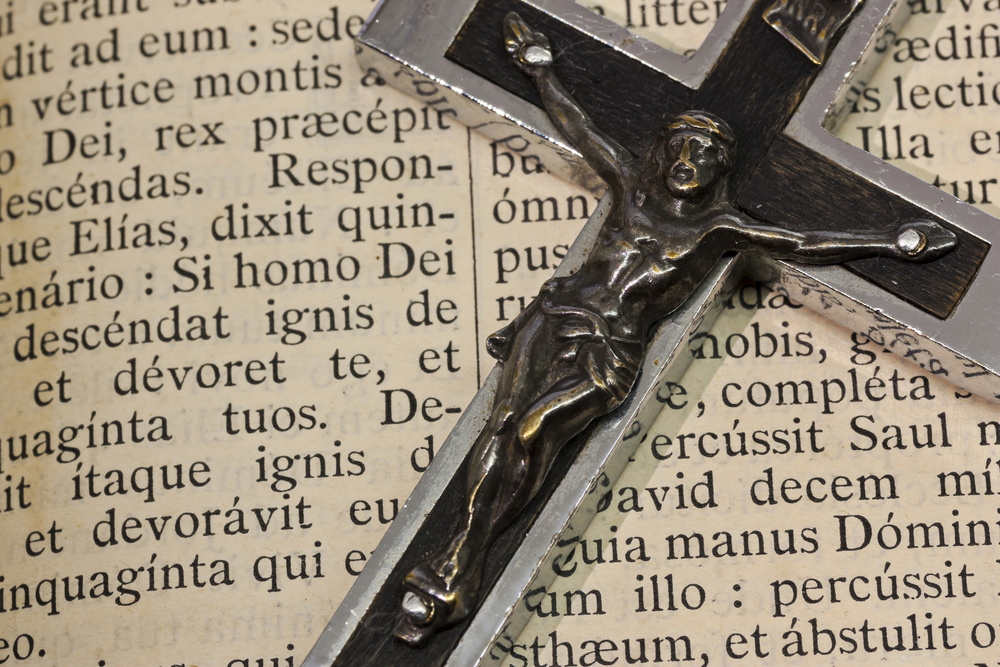God is the almighty creator of the universe, according to many religious beliefs. In Christianity, God is often referred to as the Father, Son, and Holy Spirit. This is represented in the phrase “in nomine Patris et Filii et Spiritus Sancti”, which means “in the name of the Father, and of the Son, and of the Holy Spirit” in Latin.
This phrase is often used durng Christian baptisms and other religious ceremonies. It is a reminder of the holy trinity, which is the belief that God exists in three distinct persons: the Father, the Son (Jesus Christ), and the Holy Spirit. Each person is considered to be fully God, but they are also distinct from one another.
The use of “in nomine Patris et Filii et Spiritus Sancti” represents the importance of the Holy Spirit in Christian beliefs. The Holy Spirit is often referred to as the third person of the trinity, and is believed to be the source of power and guidance for Christians. It is through the Holy Spirit that Christians are able to have a personal relationship with God.
The phrase is also a reminder of the importance of baptism in Christianity. Baptism is a sacrament that represents a person’s acceptance of Jesus Christ and their commitment to living a life of faith. By being baptized “in the name of the Father, and of the Son, and of the Holy Spirit”, Christians are symbolically entering into a relationship with God and committing themselves to following his teachings.
“in nomine Patris et Filii et Spiritus Sancti” is an important phrase in Christian beliefs. It represents the holy trinity and the importance of the Holy Spirit in guiding Christians on their spiritual journey. It is a reminder of the commitment that Christians make to God through baptism and the importance of living a life of faith.
The Significance of In Nomine Patris Et Filii Et Spiritus Sancti
The phrase “In nomine Patris et Filii et Spiritus Sancti” is a Latin expression that translates to “In the name of the Father, and of the Son, and of the Holy Spirit.” This phrase is commonly used in Christian liturgy, particularly during the sacrament of baptism and in the Trinitarian formula.
The Trinitarian formula is a theological concept that expresses the belief in the Holy Trinity, which is the belief that there is one God in three persons: the Father, the Son, and the Holy Spirit. This formula is used to invoke the presence and guidance of the Holy Trinity in various Christian rituals, such as baptism and the Eucharist.
The phrase has significant symbolic meaning as it represents the unity of the Holy Trinity and the importance of acknowledging the three distinct persons of God. The Father is the creator and sustainer of all things, the Son is the savior of humanity, and the Holy Spirit is the guide and comforter of believers.
By usng this phrase, Christians are acknowledging the divine nature of God and seeking his guidance and blessings. It is a powerful expression of faith and a reminder of the importance of the Holy Trinity in Christian theology.

Source: saqa.com
The Meaning of Spiritus Sancti
Spiritus Sancti is a Latin term that translates to “Holy Spirit” in English. In Christianity, the Holy Spirit is the third person of the Holy Trinity, along with God the Father and Jesus Christ the Son. The Holy Spirit is often referred to as the “Comforter” or the “Advocate” in the Bible, as it is believed that the Spirit guides and comforts believers in their faith.
In the New Testament, the Holy Spirit is first mentioned in the Gospel of Matthew, where Jesus is baptized and the Spirit descends upon him like a dove. This event is seen as the beginning of Jesus’ ministry and the presence of the Holy Spirit in his life.
Throughout the Bible, the Holy Spirit is mentioned in many contexts, such as the creation story in Genesis, where the Spirit of God hovers over the waters, and in the book of Acts, where the Spirit empowers the disciples to spread the message of Jesus after his death and resurrection.
Belief in the Holy Spirit is a central aspect of Christian faith, as it is seen as the presence of God withn believers and the source of their spiritual power and guidance. It is also believed that the Holy Spirit plays a role in the sanctification process, helping believers to become more like Christ in their thoughts and actions.
Spiritus Sancti is a Latin term that refers to the Holy Spirit in Christianity, seen as a powerful and guiding force in the lives of believers.
The Meaning of Nomen Patris
Nomen Patris is a Latin term that translates to “Father’s name” in English. It is a phrase that is oten used in religious contexts to refer to the Holy Trinity, which consists of God the Father, God the Son (Jesus Christ), and God the Holy Spirit.
The term Nomen Patris is typically used in prayers, such as the Sign of the Cross, which begins with the phrase “In the name of the Father (Nomen Patris), and of the Son, and of the Holy Spirit.” This prayer is a way for Christians to acknowledge their belief in the Holy Trinity and to seek the blessings and protection of God.
In addition to its use in religious contexts, Nomen Patris is also used in academic and legal settings. For example, in genealogy research, Nomen Patris can refer to the father’s name of an individual or ancestor. In legal documents, Nomen Patris can be used as a way of identifying a person by their father’s name.
The term Nomen Patris carries significant meaning and is used in various contexts to refer to the importance of acknowledging God the Father and seeking his blessings and protection.
The Language of ‘In Nomine Patri’
In nomine Patris is a Latin phrase commonly used in Christian religious contexts. It translates to “in the name of the Father” in English. However, it is oten used as part of a longer phrase, which includes “et Filii et Spiritus Sancti,” meaning “and of the Son and of the Holy Spirit.” The complete phrase is “in nomine Patris et Filii et Spiritus Sancti,” which translates to “in the name of the Father, and of the Son, and of the Holy Spirit.” This phrase is commonly used in Christian prayers, particularly in the Catholic Church, as a way of invoking the Holy Trinity.

Conclusion
The concept of God has been a central topic in many religions and belief systems throughout history. While there may be different understandings of God, the common thread is the belief in a higher power that governs the universe and has a significant influence on human lives.
For Christians, the belief in God is grounded in the Holy Trinity – the Father, Son, and Holy Spirit. This belief is based on the teachings of Jesus Christ and is considered an essential part of Christian theology. The Holy Spirit is seen as the source of divine power that can guide believers and give them strength and wisdom.
In addition, the existence of God has been a topic of debate among philosophers and scientists for centuries. While some argue for the existence of God through various philosophical and logical arguments, othrs reject the idea of a higher power altogether.
Ultimately, the belief in God is a personal choice and can have a significant impact on an individual’s worldview and moral values. Whether one believes in God or not, the topic of God and spirituality remains an important aspect of human culture and continues to shape our understanding of the world around us.
